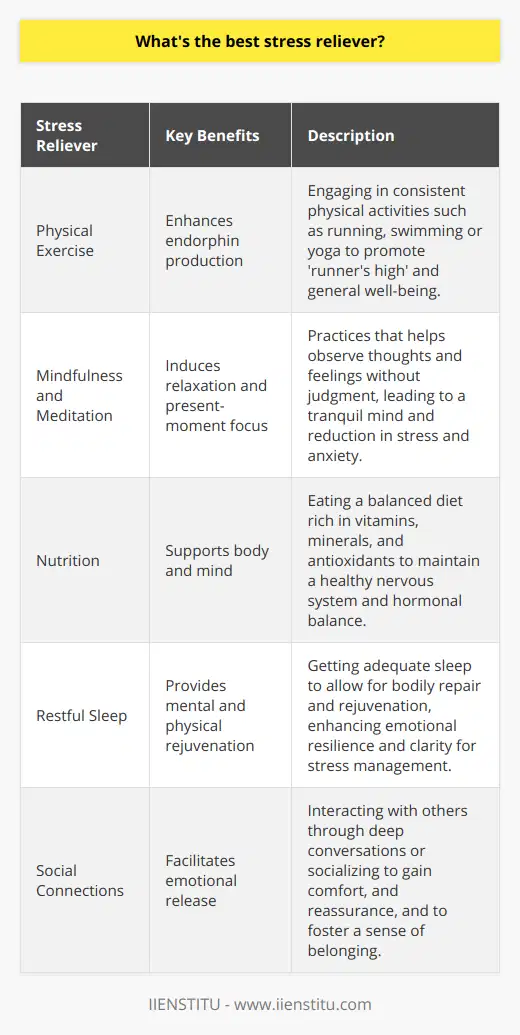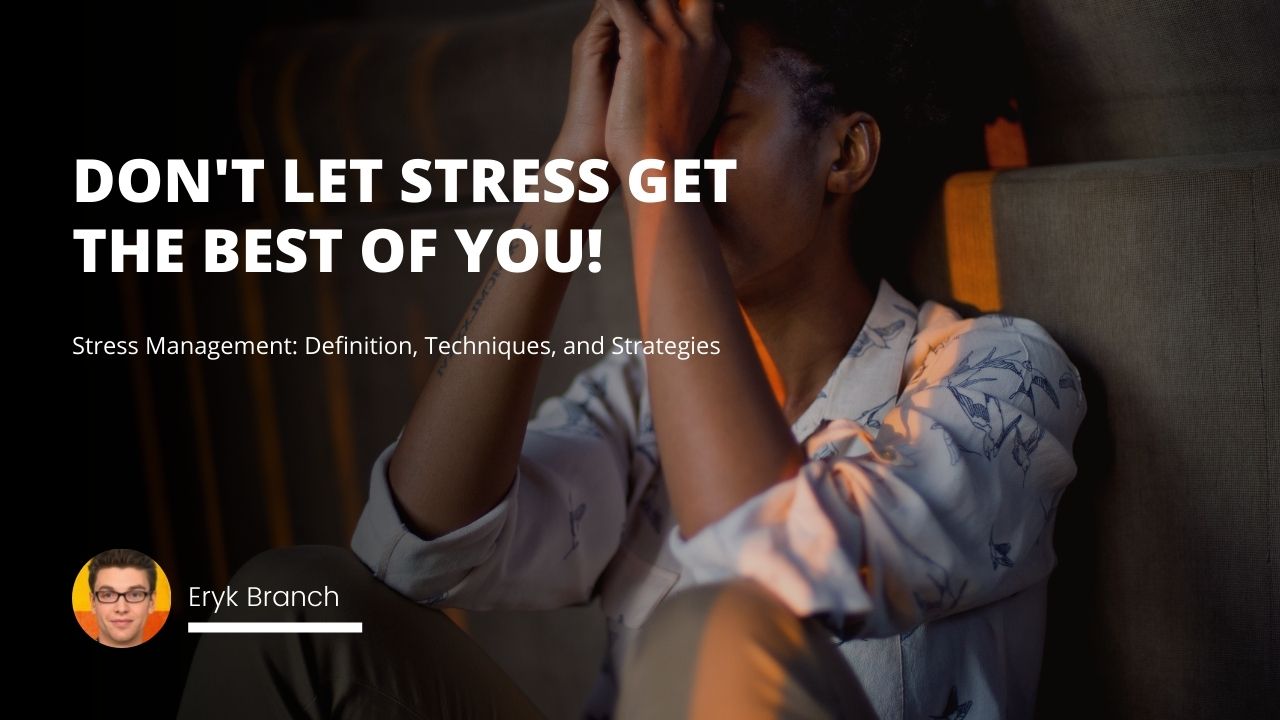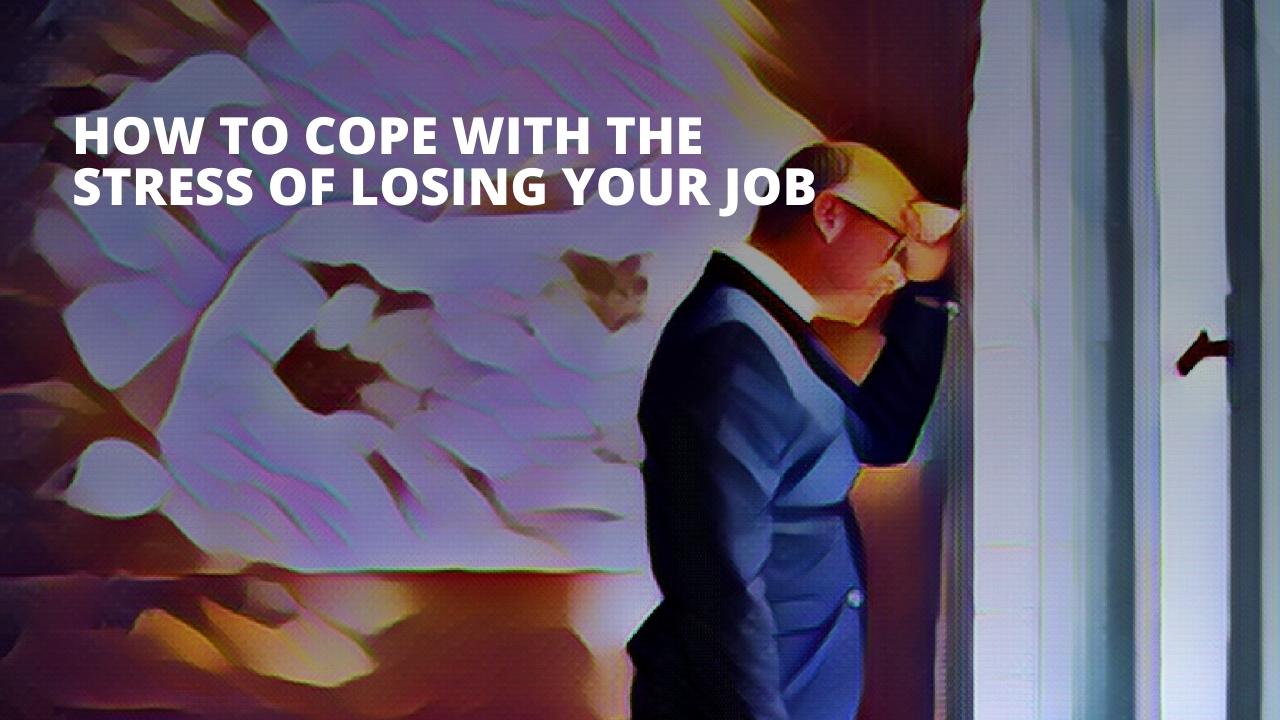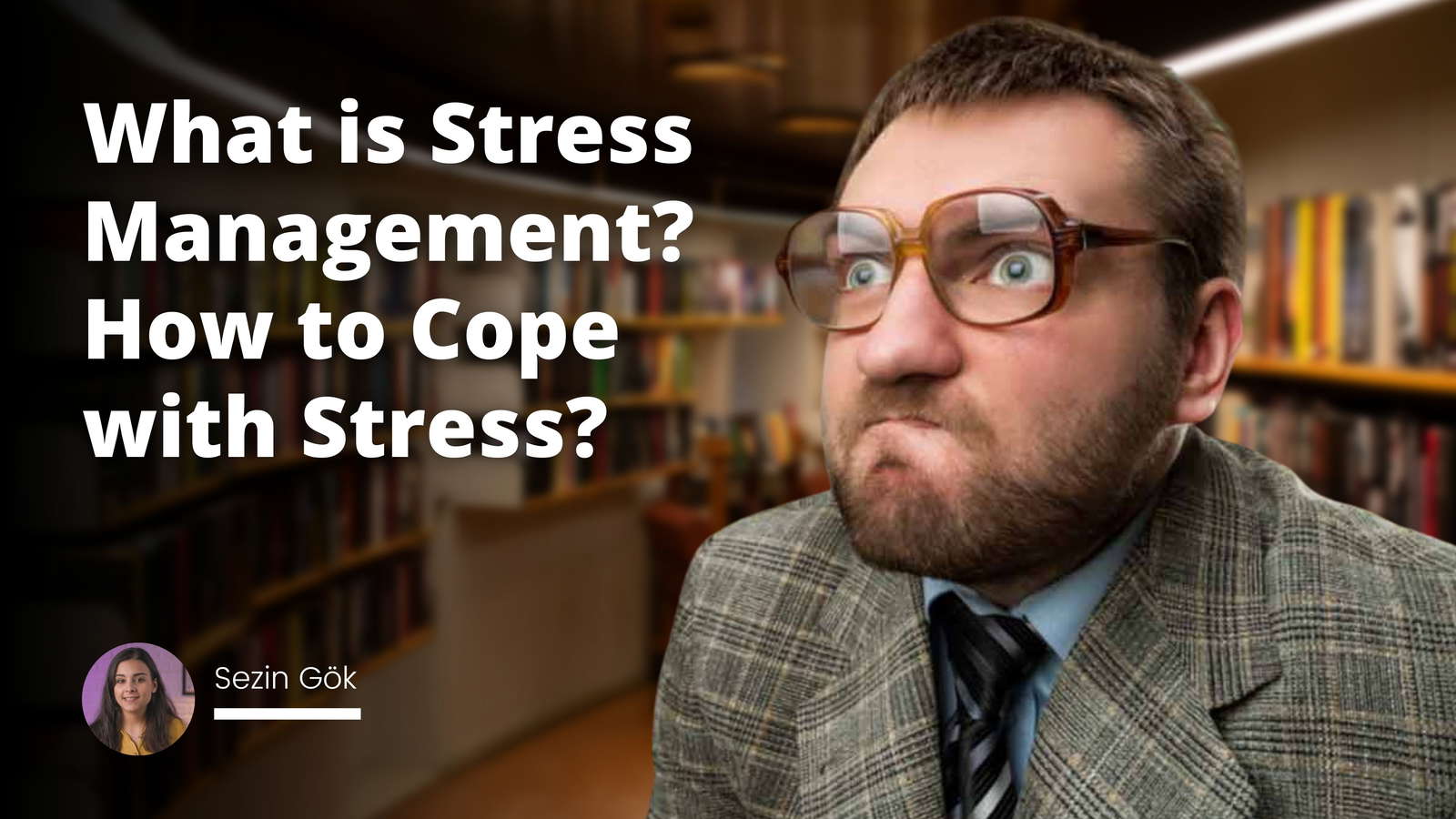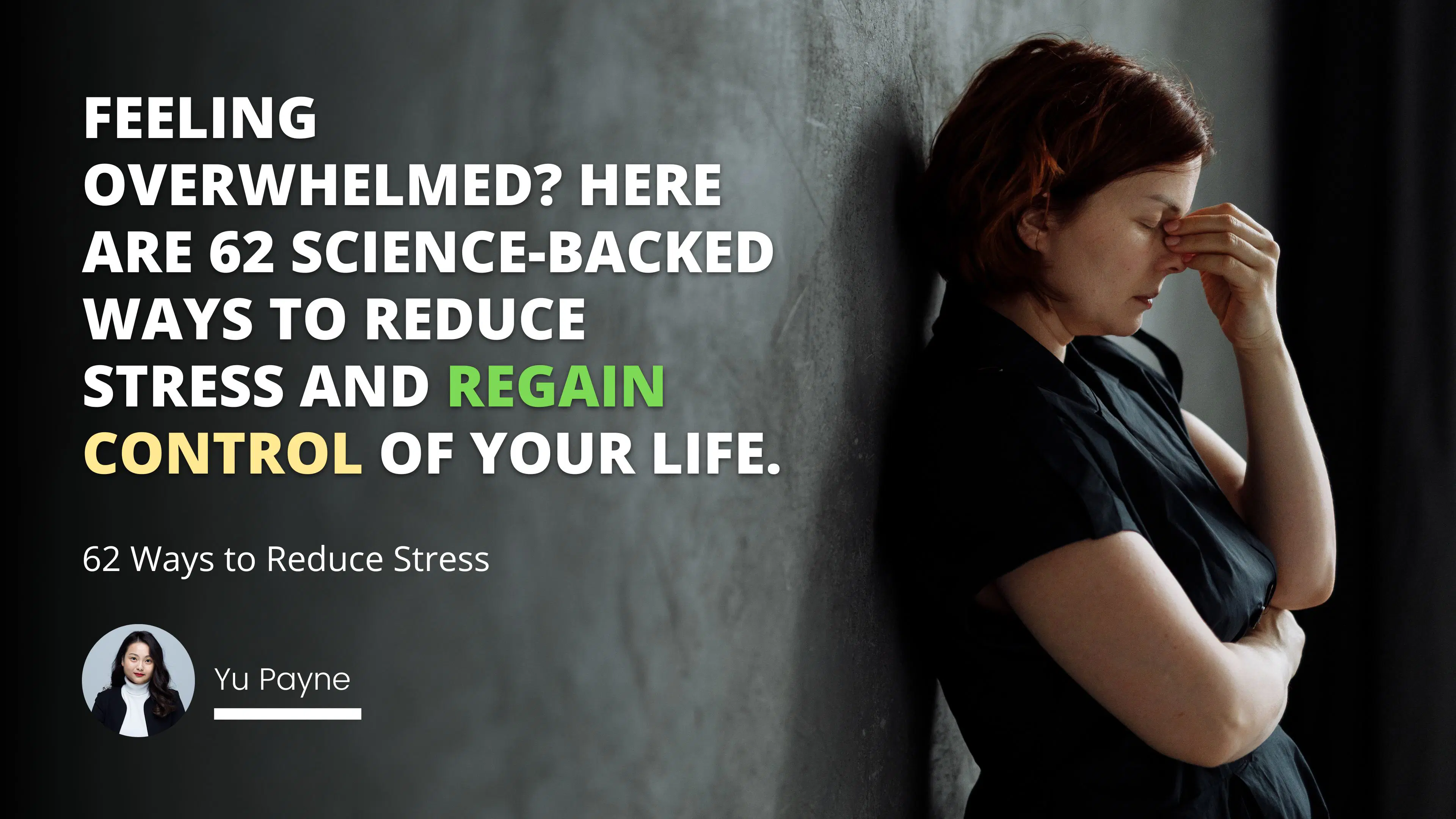
Stress is a part of life, but it doesn't have to control you. You can do many things to manage stress and feel more in control of your life. This blog post will give you 62 techniques to reduce stress. Try a few and see what works best for you!
1. Get organized. Having a plan and knowing what to do can help reduce stress. Make a list of what needs to be done and tackle one thing at a time.
2. Set priorities. Only some things on your to-do list are equally important. Determine what needs to be done first and put your energy into that. The rest can wait!
3. Take breaks. When you're feeling overwhelmed, take a step back and take a few deep breaths. Or, take a break from what you're doing altogether and come back when you're feeling refreshed.
4. learn to say no. You can do some things! It's OK to say no when feeling overwhelmed or stressed out.
5. Delegate tasks. If there's too much on your plate, delegate some of the jobs to others willing to help.
6. Simplify your life. One way to reduce stress is to simplify your life by eliminating things you don't need or are causing unnecessary stress.
7. Exercise regularly. Exercise releases endorphins, which have mood-boosting effects. A regular exercise routine can help reduce stress levels overall!
8. Get enough sleep. When you're tired, everything seems more complicated than it is. So be sure to get enough sleep to face the day with energy and positivity.
9. Make time for yourself. It's important to schedule some "me time" into your day or week. Whether reading, taking a bath or going for a walk, do something that you enjoy and makes you feel good.
10. Connect with loved ones. Spending time with loved ones can help reduce stress. Talk about what's going on in your life and share your feelings. They may be able to offer support and understanding.
11. Avoid negative people. Some people bring you down. If you can, avoid spending time with them or limit your interactions.
12. Do something you're good at. When you're feeling stressed, doing something that makes you feel good about yourself can be helpful. Doing something, you're good at can boost your confidence and help you feel more capable.
13. Help others. One way to forget your problems is to focus on helping someone else. Volunteer your time, lend a listening ear, or do something nice for someone else. It'll make you feel good and take the focus off of your stressors.
14. Laughter is the best medicine. They say laughter is the best medicine, and it's true! When you laugh, you release endorphins and feel happier overall. So watch a funny movie, spend time with friends who make you laugh, or read a comic book.
15. Get outside. Sometimes, being in nature can help reduce stress. Take a walk in the park, hike, or sit outside and enjoy the fresh air.
16. Connect with animals. If you have a pet, spending time with them can help reduce stress levels. Studies have shown that interacting with animals can lower blood pressure and heart rate.
17. Listen to music. Music can have a potent effect on your mood. Listen to music that makes you feel good or relaxes you.
18. Dance it out. Dancing is a great way to let loose and have some fun! So turn up the music and let yourself go.
19. Do something creative. Expressing yourself through art, writing, or another creative outlet can be therapeutic. It's a great way to get your feelings out and can help reduce stress overall.
20. Practice meditation. Meditation is a practice that can help you focus and calm your mind. There are many ways to meditate, so find one that works best for you.
21. Use aromatherapy. Certain smells can have a calming effect. For example, try diffusing essential oils or using a scented lotion.
22. Avoid caffeine. Caffeine can make anxiety worse and can interfere with sleep. So if you're feeling stressed, it's best to avoid caffeine altogether.
23. Eat healthily. Eating nutritious foods helps your body to function at its best. When stressed, eat plenty of fruits, vegetables, and whole grains.
24. Limit alcohol. Although alcohol may help you relax in the short term, it can worsen stress in the long run. Alcohol is a depressant and can interfere with sleep, making stress harder to deal with.
25. Practice deep breathing. Deep breathing is a simple but effective way to reduce stress. It helps to slow down your heart rate and can be done anywhere, at any time.
26. Try yoga. Yoga combines deep breathing with physical activity to help you relax and de-stress. There are many different types of yoga, so find one that works best for you.
27. Get a massage. Massages are not only relaxing, but they can also help to reduce muscle tension and pain. If you're stressed, consider getting a professional massage or trying some self-massage techniques.
28. Use a sauna. Saunas can help to detoxify the body, improve circulation, and reduce stress levels. If you have access to a sauna, try spending some time there to relax and de-stress.
29. Take a warm bath. Draw yourself a warm bath and add some soothing aromatherapy or Epsom salt to help you relax. Spend time soaking in the tub to let your stress melt away.
30. Practice progressive muscle relaxation. Progressive muscle relaxation is a technique that involves tensing and relaxing different muscle groups in the body. This can help to reduce muscle tension and promote overall relaxation.
31. Get enough sleep. When you're tired, it's harder to deal with stress. So be sure to get enough sleep every night to feel rested and refreshed during the day.
32. Exercise regularly. Exercise is a great way to reduce stress and improve your overall health. Just 30 minutes of exercise each day can make a big difference.
33. Take breaks during the day. When you're feeling overwhelmed, take a few minutes to relax and rejuvenate. Step away from your work, take a break from technology, and take some time to breathe.
34. Find a hobby. Doing something you enjoy can help you to relax and de-stress. So whether it's knitting, painting, or hiking, find a hobby that you can use to unwind and de-stress.
35. Spend time in nature. Nature has a way of calming the mind and easing stress. So spend some time outside daily, and include some green space in your daily routine.
36. Connect with friends and family. Spending time with loved ones is a great way to reduce stress. Whether catching up over coffee or going for a walk, quality time with those you care about can make a big difference.
37. Laugh it off. Laughter is one of the best ways to reduce stress. In addition, it helps to release endorphins, which have mood-boosting effects. So watch a funny movie, read a hilarious book, or spend time with friends who make you laugh.
38. Volunteer. Giving back to your community can help you to feel good and reduce stress. Find a cause important to you and volunteer your time to help.
39. Spend time with pets. Pets can provide companionship, love, and support- all of which can help to reduce stress. If you don't have a pet, consider spending time with friends or family members' pets.
40. Cut back on commitments. Trying to do too much can lead to stress and burnout. Instead, simplify your schedule by cutting back on promises and saying no to things that aren't really necessary.
41. Learn how to say no. Of course, it's OK to say no sometimes, incredibly when feeling overwhelmed. However, learning to say no can help reduce stress and protect your time and energy.
42. Simplify your life. Decluttering your home and simplifying your schedule can help to reduce stress. Let go of things that no longer serve you, and focus on what's essential in your life.
43. Set boundaries. Boundaries are essential for a healthy, balanced life. They help you to protect your time, energy, and sanity. So if you're feeling stressed, ensure that you're setting appropriate boundaries.
44. Practice self-compassion. Beating yourself up will only make stress worse. Instead, practice self-compassion. Treat yourself with the kindness and understanding you would extend to a friend.
45. Do something nice for someone else. When you make someone else's day, it can also make your day better. Random acts of kindness are a great way to reduce stress and feel good.
46. Forgive yourself. We all make mistakes - it's part of being human. If you're carrying around guilt or resentment, it will only cause worse stress. Learn to forgive yourself and move on from your past mistakes.
47. Seek professional help. If you're struggling to cope with stress, don't be afraid to seek professional help. A therapist can provide support and guidance as you learn how to manage stress.
48. Practice meditation. Meditation can help to calm the mind and reduce stress. There are many different types of meditation, so find a practice that works for you.
49. Get enough sleep. Sleep is essential for good health and well-being. When you're stressed, it's even more important to get enough rest. Make sure you get 7-8 hours of sleep each night.
50. Eat healthily. Eating a nutritious diet is an essential part of managing stress. Fuel your body with whole foods and limit processed foods and sugary snacks.
51. Avoid caffeine. Caffeine can worsen stress by increasing anxiety and making it harder to sleep. If you're stressed, cut back on caffeine or eliminate it from your diet.
52. Drink in moderation. Alcohol can help relax the mind and body, but it can also worsen stress. If you're struggling to cope with stress, limit your alcohol intake or avoid it altogether.
53. Avoid drugs. Drugs can lead to addiction and other health problems. They can also make stress worse. So if you're struggling with anxiety, stay away from drugs and alcohol.
54. Get regular exercise. Exercise is a great way to reduce stress and promote overall health and well-being. Make sure you get at least 30 minutes of exercise each day.
55. Take breaks. When you're feeling overwhelmed, take a break. Step away from your work, take a walk, or take some time to relax. Vacations can help to reduce stress and improve your focus.
56. Connect with nature. Spend time outside in nature, and allow yourself to disconnect from technology. Being in nature can help to reduce stress and promote relaxation.
57. Make time for hobbies. Hobbies can provide a sense of enjoyment and satisfaction. They're also a great way to reduce stress. So make sure that you're making time for activities that you enjoy.
58. Learn something new. Challenging yourself with new experiences can help to reduce stress. Learning something new can also provide a sense of accomplishment and satisfaction.
59. Spend time with friends and family. When you're feeling stressed, spend time with those you love. Social support is essential for managing stress. Surround yourself with positive people who make you feel good.
60. Be assertive. Don't be afraid to speak up for yourself. Learning to communicate assertively can help to reduce stress and promote healthy relationships.
61. Practice relaxation techniques. Relaxation techniques can help to calm the mind and body. There are many different techniques that you can try, so find one that works for you.
62. Seek professional help. If you're struggling to cope with stress, don't be afraid to seek professional help. A therapist can provide support and guidance as you learn how to manage stress.
Whatever works for you, make sure to give yourself some task-free time every day. It doesn't have to be much – even 15 minutes will do. If you need more guidance on how to reduce stress in your life, join our stress management course today. We offer a variety of tips and techniques that can help you achieve a better work-life balance and lead a less stressful existence. So don't wait – sign up now and start reducing your stress levels today!
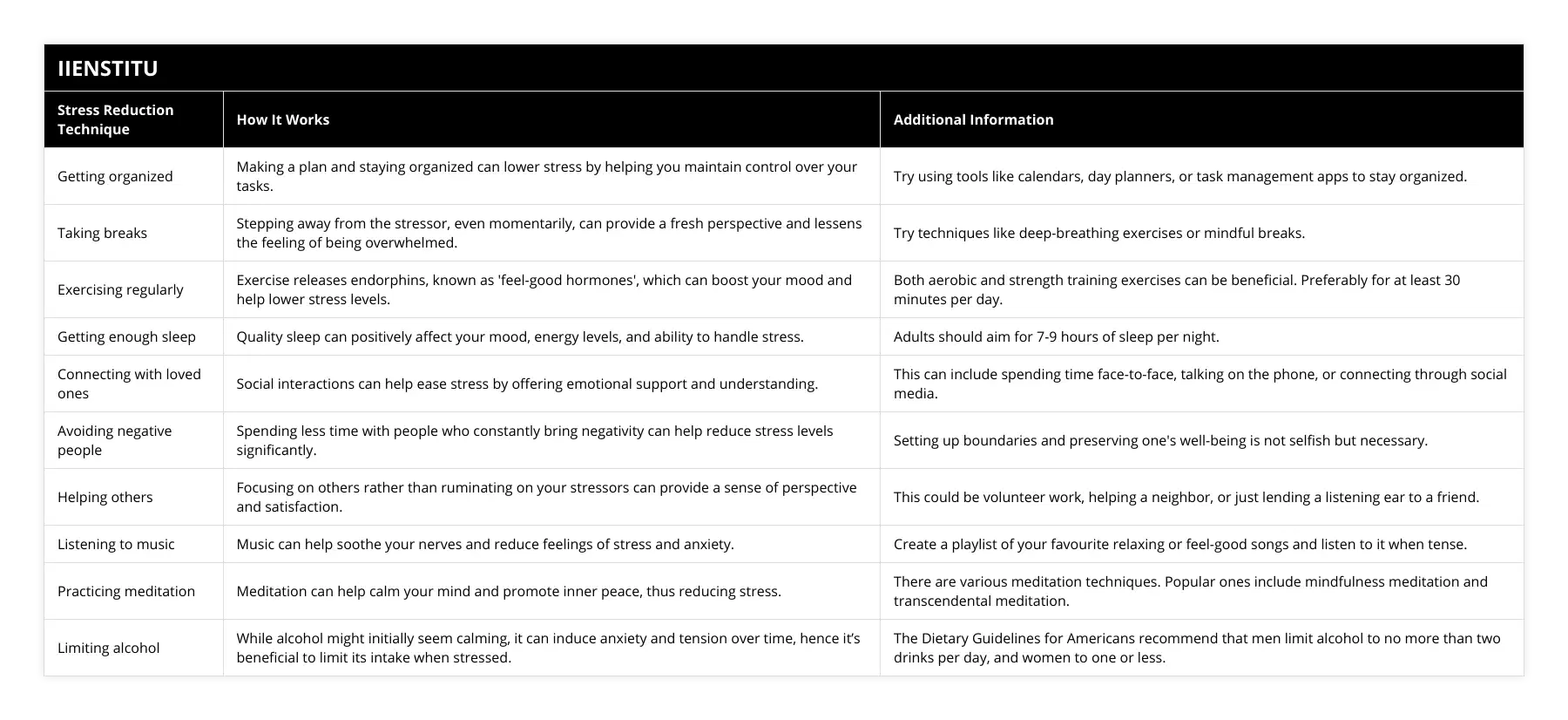
Frequently Asked Questions
What are some of the best ways to reduce stress?
stress management is vital for our mental and physical wellbeing. While stress is a normal part of life, too much stress can lead to negative health effects. To reduce stress, it is important to identify our stressors and find healthy coping mechanisms. Some helpful stress management techniques include exercise, relaxation methods such as yoga or meditation, and journaling. It is also important to make time for activities that we enjoy and to nurture our relationships with family and friends. By taking proactive steps to manage stress, we can improve our overall health and wellbeing.

What are some of the best ways to deal with stress?
Stress management turns out to be one of the most popular search terms on the internet, and it's no wonder why. stress is a normal part of life that can have a major impact on our mental and physical health. While we can't always control the sources of stress in our lives, there are a number of things we can do to manage the stress we're feeling. Some stress-management techniques include exercise, relaxation methods such as yoga or meditation, and journaling. Taking time for yourself to do things you enjoy can also help to reduce stress levels. If you're finding that your stress is impacting your everyday life, it may be time to seek out professional help. A qualified therapist can work with you to develop a stress-management plan that suits your unique needs.
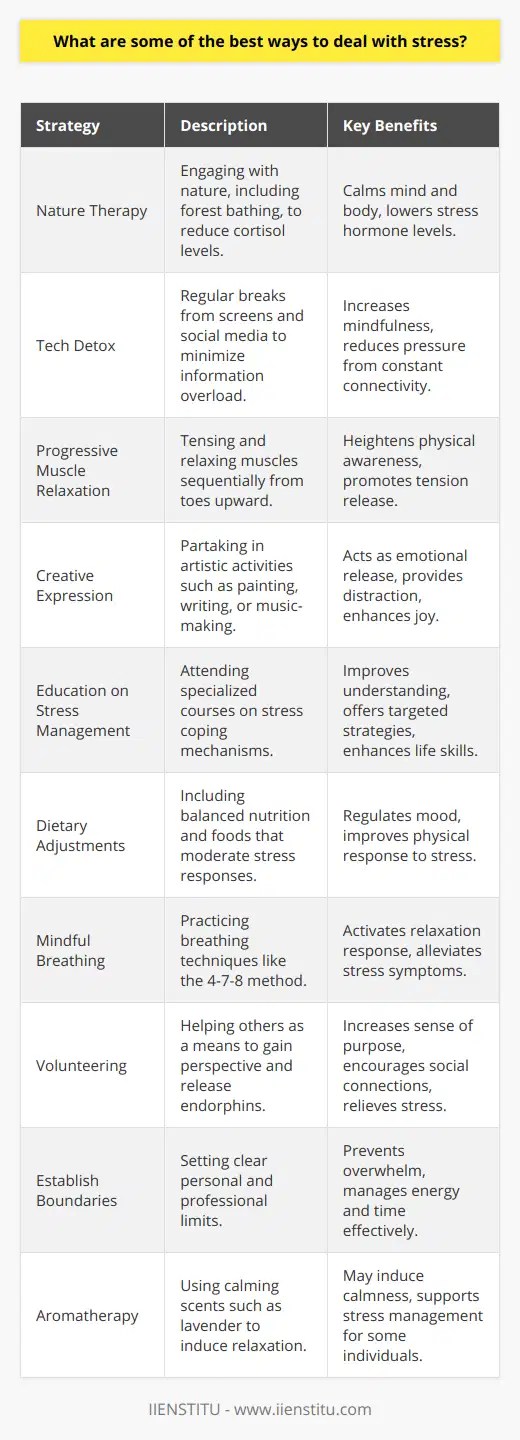
How can I reduce stress in my life?
Stress is a normal part of life, but it can become overwhelming if not managed effectively. There are many different stress management techniques that can help to reduce stress levels and improve overall well-being. Some simple stress management techniques include regular exercise, deep breathing, and positive self-talk. Additionally, it is important to identify stress triggers and find healthy ways to cope with them. For example, instead of relying on alcohol or cigarettes to deal with stress, try journaling or meditation. By making small changes in your lifestyle, you can make a big impact on your stress levels.
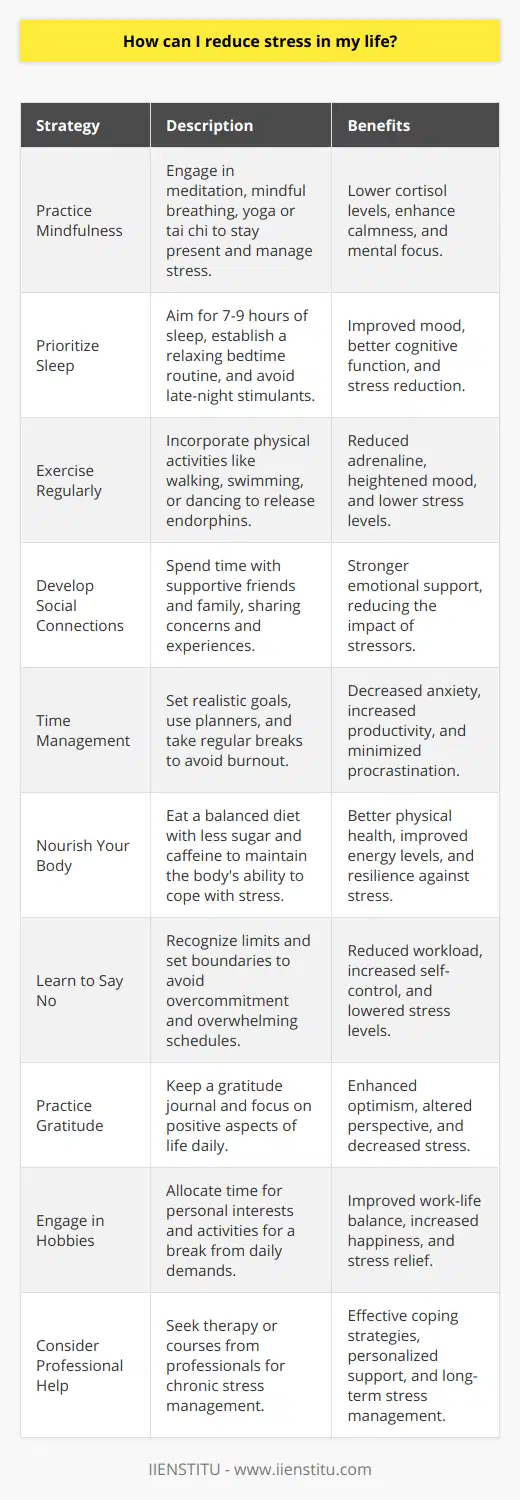
What scientific research supports the 62 ways to reduce stress?
The 62 ways to reduce stress have been compiled from many scientific studies and reports. Research has found that activities such as mindfulness, exercise, and positive thinking can help to reduce stress and improve mental health. Other research has suggested that activities such as nature walks, deep breathing, journaling, and yoga can be beneficial for reducing stress. Additionally, research has found that social support and spending time with friends and family can be helpful in managing stress levels.
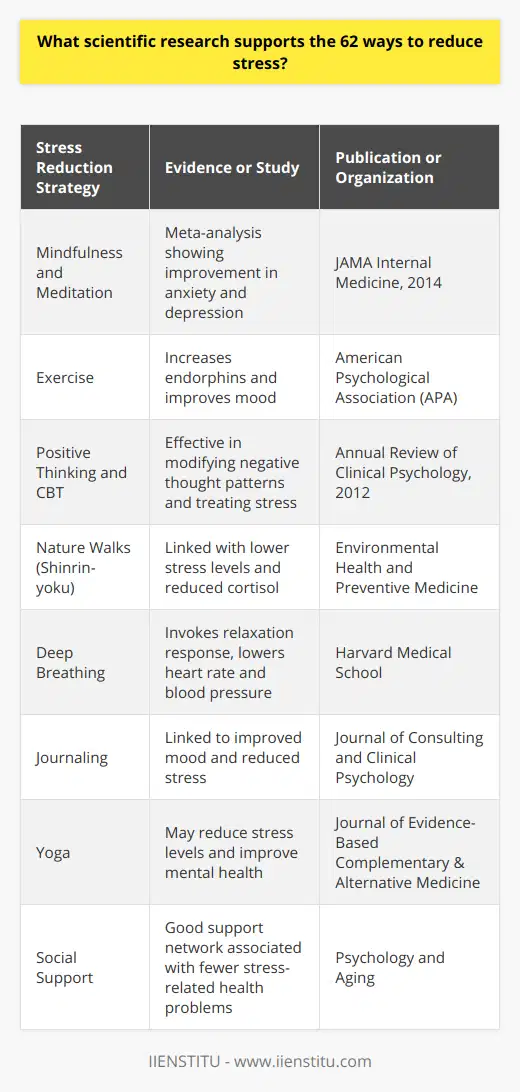
How can I apply the 62 ways to reduce stress in my daily life?
Set realistic goals and expectations.
Prioritize your tasks and commitments.
Take regular breaks from work and activities.
Practice deep breathing, relaxation, and mindfulness.
Exercise regularly and eat healthily.
Make time to socialize and have fun.
Get enough quality sleep.
Learn to say “no” to activities or commitments that don’t align with your goals.
Spend time outdoors and in nature.
Engage in activities that help you focus, such as yoga, meditation, or tai chi.
Spend time with positive, supportive people.
Develop effective coping strategies for difficult situations.
Manage your time better.
Practice positive self-talk and affirmations.
Take time to nurture your relationships.
Take a break from technology and social media.
Find a creative outlet, such as painting, drawing, or writing.
Make time for hobbies and interests.
Practice gratitude and be thankful for what you have.
Laugh more often.
Make time for relaxation and self-care.
Avoid perfectionism and strive for excellence.
Find ways to express yourself.
Set boundaries and learn to say “no”.
Identify and challenge negative thoughts.
Pursue activities that bring you joy.
Take time for yourself and do things that make you feel good.
Invest in yourself and your personal growth.
Seek professional help if needed.
Connect with your spiritual beliefs and values.
Learn to forgive and let go of resentments.
Accept yourself and be open to change.
Develop healthy coping skills for stress.
Listen to music that uplifts and energizes you.
Find ways to simplify your life.
Practice relaxation techniques, such as progressive muscle relaxation.
Take a warm bath or shower.
Spend time with animals or pets.
Read uplifting and inspiring books.
Take a walk or go for a bike ride.
Do something new and adventurous.
Practice self-compassion and self-love.
Practice yoga, tai chi, or qigong.
Spend time volunteering and helping others.
Practice positive affirmations.
Use aromatherapy or essential oils.
Use visualization and guided imagery.
Listen to calming and uplifting music.
Spend time in nature and be mindful of your surroundings.
Take up a new hobby or activity.
Spend time with friends and family.
Write in a journal or diary.
Get a massage or bodywork.
Practice mindful eating and savor your food.
Avoid caffeine and alcohol.
Play a sport or game.
Take a class or workshop.
Connect with your community or spiritual group.
Practice self-care and nurture yourself.
Explore different forms of art.
Spend time in quiet and solitude.
Develop a meaningful spiritual practice.
To apply these 62 ways to reduce stress in your daily life, you could start by picking one or two of the strategies and implementing them on a regular basis. For example, you could practice deep breathing, relaxation, and mindfulness every day or take regular breaks from work and activities. You could also prioritize tasks, practice positive self-talk, and take time to nurture relationships. Additionally, you could engage in activities that bring you joy and practice self-care. Finally, you could explore different forms of art, connect with your spiritual beliefs, and practice gratitude.
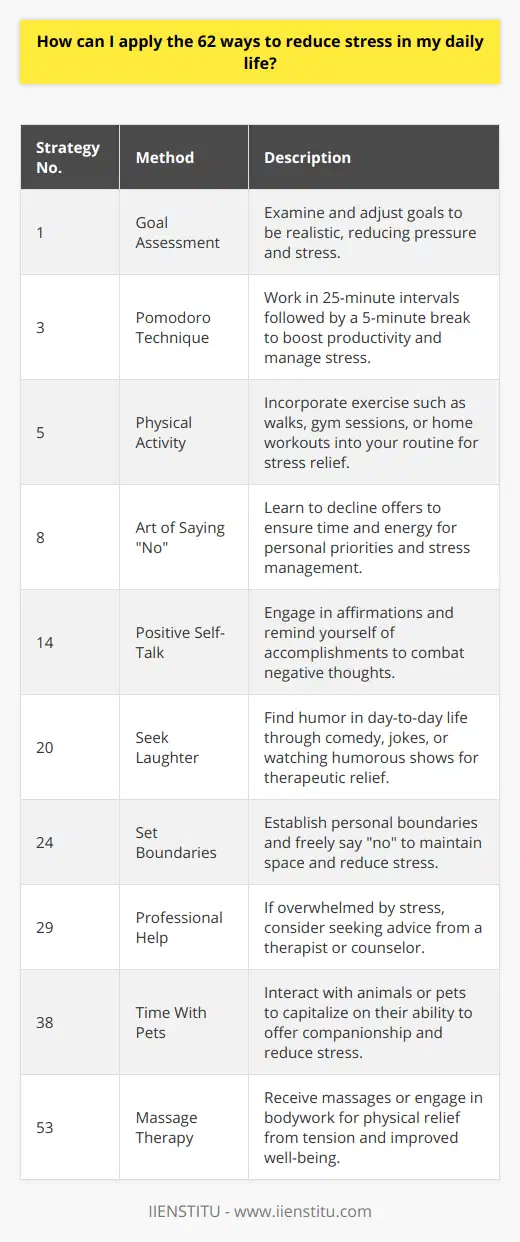
What are the benefits of reducing stress?
Improved physical health: Reducing stress can help to improve physical health by reducing the risk of developing illnesses such as heart disease, high blood pressure, obesity, and type 2 diabetes.
Improved mental health: Stress can lead to mental health issues such as depression, anxiety, and insomnia. Reducing stress can help to improve mental well-being and overall happiness.
Improved productivity: Stress can lead to decreased productivity and focus. Reducing stress can help to improve focus and productivity in day-to-day tasks.
Improved relationships: Stress can cause tension and conflict in relationships. Reducing stress can help to improve communication and relationships with family, friends, and colleagues.
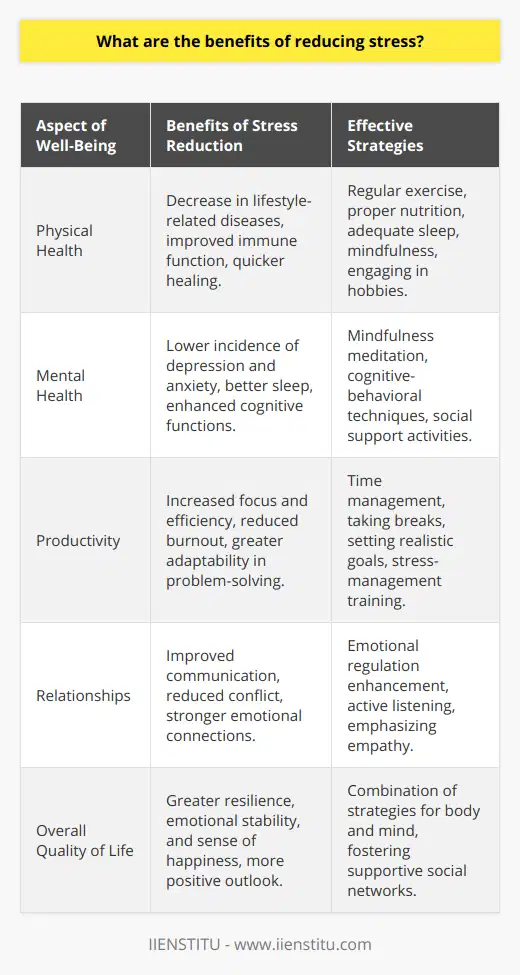
What are the 15 ways to cope with stress?
Coping Strategies for Stress
Mindfulness Meditation: Practicing mindfulness helps individuals to focus on the present moment, creating a sense of tranquility and reducing stress.
Physical Exercise: Engaging in regular physical activity releases endorphins, enhancing mood and reducing stress levels.
Deep Breathing: Deep, slow breaths can activate the relaxation response, easing stress and promoting mental clarity.
Balanced Diet: Consuming a balanced diet rich in vitamins, minerals, and antioxidants can improve physical health and reduce stress.
Quality Sleep: Prioritizing a consistent sleep schedule ensures proper rest, which is crucial for managing stress.
Time Management: Efficiently managing time reduces the pressure of deadlines, minimizing stress.
Setting Realistic Goals: Establishing attainable goals supports self-confidence and diminishes feelings of stress.
Social Support: Having a strong support network of friends and family can alleviate stress by providing comfort and assistance.
Humor: Laughter triggers the release of endorphins and promotes a sense of well-being, reducing stress.
Expressing Gratitude: Focusing on the positive aspects of life and expressing gratitude can create a more optimistic mindset, resulting in less stress.
Progressive Muscle Relaxation: Consciously relaxing groups of muscles can promote feelings of calm and reduce stress.
Music Therapy: Listening to soothing music can induce relaxation and lower stress levels.
Journaling: Writing thoughts and feelings can serve as an outlet for stress and promote self-reflection.
Art Therapy: Engaging in creative activities can promote relaxation, stimulate the brain, and relieve stress.
Professional Help: Consulting a mental health professional can provide tailored guidance and coping strategies to address individual stressors.

What are the 5 A's to help avoid stress?
The 5 A's of Stress Management
Avoiding stress is crucial for maintaining both physical and mental well-being. The 5 A's strategy, comprised of Awareness, Avoidance, Alteration, Adaptation, and Acceptance, can be instrumental in managing stress.
Awareness
The first step in managing stress is to become self-aware and identify the triggers responsible for stress. By understanding the specific events, situations, and relationships that contribute to stress, one can constructively address and mitigate such factors, leading to a reduced stress level.
Avoidance
Some stressors can be avoided altogether, or at least minimized, by making proactive choices. This may involve avoiding people who consistently induce stress or refraining from engaging in situations that are known to cause stress. Maintaining healthy boundaries and seeking balanced relationships can contribute to a stress-free lifestyle.
Alteration
Sometimes, stressors cannot be avoided, but one can change the way they approach these stress-inducing situations. Communication and assertiveness can play a vital role in managing stress by addressing and resolving conflicts, making time management adjustments, and actively seeking solutions to pressing issues.
Adaptation
Adapting to stress involves adjusting one's mindset and cultivating a more positive outlook. Everyone perceives situations differently, and adjusting expectations may alleviate some of the stress experienced. Reframing stress as an opportunity for growth, rather than a setback, and adopting stress-reduction techniques such as deep breathing, mindfulness, and meditation can help in adapting to stress more effectively.
Acceptance
Finally, recognizing that some stressors are beyond one's control is critical in managing stress. Accepting that certain events, situations, and relationships cannot be altered, and focusing on the aspects of life that can be controlled, provides a sense of empowerment and helps reduce stress levels. Embracing the inevitability of change and uncertainty, while remaining resilient in response to such situations, is essential for effective stress management.
Implementing the 5 A's strategy can significantly help in managing stress and promoting overall well-being. By becoming more mindful of stress triggers and adopting practical approaches, an individual can lead a healthier, more balanced life.
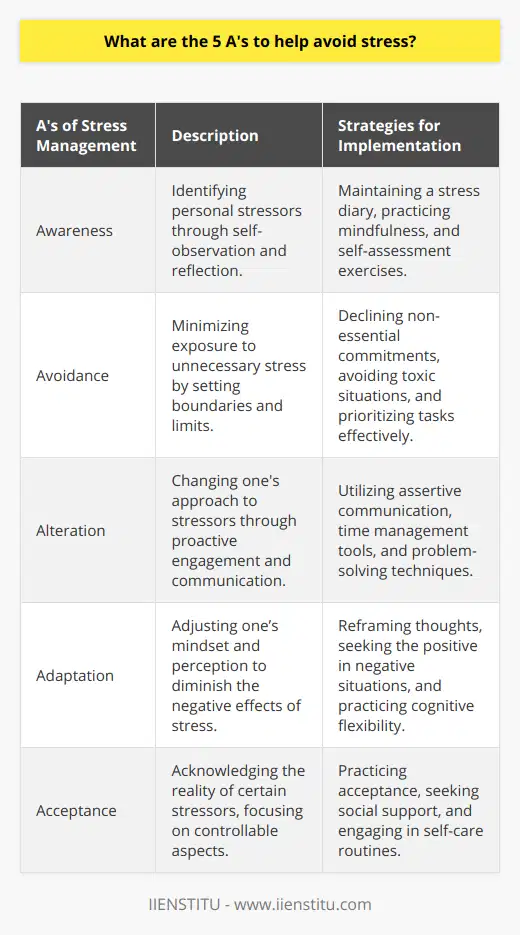
How do you reduce super stress?
Methods for Reducing Super Stress
Coping with extreme stress, also known as super stress, involves implementing various strategies designed to alleviate overbearing mental and physical pressure. By following these techniques, individuals may experience reduced anxiety levels and attain a balanced state of mental health.
Physical Exercise
Frequent physical activity has been shown to lessen stress by releasing endorphins in the brain, which act as natural painkillers and mood elevators. Engaging in exercises such as jogging, swimming, or yoga contribute positively to mental well-being by reducing cortisol levels, the hormone responsible for stress.
Healthy Diet
Consuming a balanced diet plays a crucial role in managing stress. Eating nutrient-rich foods such as fruits, vegetables, and whole grains provide the body with essential vitamins and minerals required to maintain optimal mental health. Limiting the intake of processed foods, caffeine, and sugary beverages helps to stabilize energy levels and prevent mood swings.
Adequate Sleep
Ensuring an adequate amount of nighttime rest, ideally between 7-9 hours a night, is paramount to combating super stress. Sleep deprivation can exacerbate stress levels by increasing irritability and reducing mental clarity. Establishing a consistent sleep schedule and practicing good sleep hygiene promotes healthier sleep patterns and overall well-being.
Mindfulness Techniques
Incorporating mindfulness practices like meditation, deep breathing exercises, or progressive muscle relaxation can alleviate stress symptoms. These techniques help to refocus attention on the present moment, ultimately fostering awareness and improving emotional regulation.
Social Support
Building a strong social network of friends and family can provide emotional support during times of elevated stress. Sharing concerns with a trusted confidant and engaging in leisurely activities with loved ones can foster resilience and provide relief from overwhelming responsibilities.
Time Management
Developing time management skills is essential in alleviating super stress. Prioritizing responsibilities, setting realistic goals, and breaking tasks into smaller steps can prevent overcommitment and reduce feelings of being overwhelmed.
In conclusion, reducing super stress requires a multifaceted approach aimed at addressing both the physical and mental aspects of well-being. Incorporating a combination of physical activities, mindfulness techniques, and social support, along with maintaining a healthy diet, adequate sleep, and effective time management can contribute to successful stress management and improved mental health.
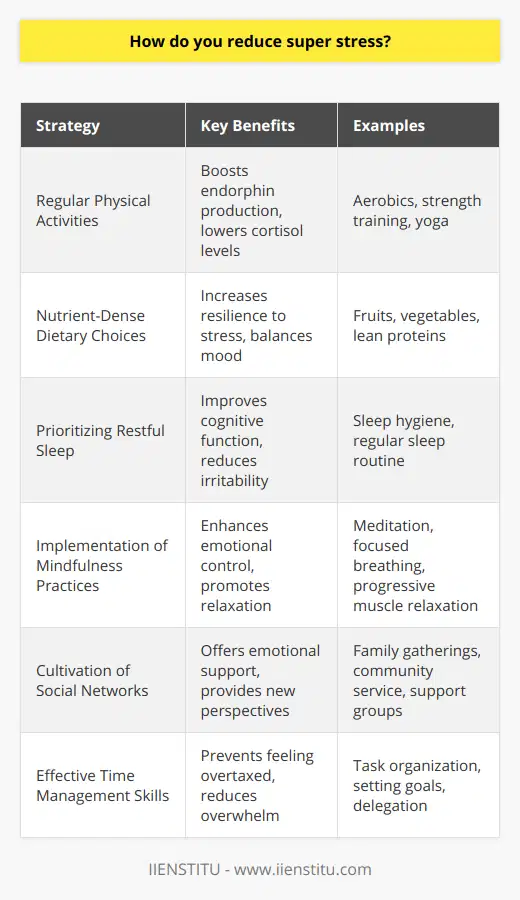
What are the mechanisms behind the 5 A's for stress avoidance?
Mechanisms of the 5 A's for Stress Avoidance
Understanding the 5 A's
The five A's for stress avoidance are awareness, attitude, acceptance, action, and adaptation. These mechanisms help individuals manage stressors and maintain mental and emotional well-being.
I. Awareness
Being aware of one's thoughts, emotions, and body sensations helps an individual identify potential stressors. This self-awareness allows a person to anticipate stressful situations, recognize triggers, and take the necessary steps to address them.
II. Attitude
A positive attitude is vital in coping with stress. Adopting an optimistic mindset, reframing negative thoughts, and focusing on potential solutions rather than problems help reduce stress levels. Additionally, practicing gratitude and maintaining a sense of humor can enhance a person's overall well-being.
III. Acceptance
Accepting that stress is a natural part of life enables individuals to better cope with it. Recognizing that not all stressors can be controlled or eliminated helps people make peace with challenging situations. This acceptance leads to healthier responses to stress.
IV. Action
Taking proactive steps to address stress promotes emotional well-being. Actions may include developing effective problem-solving skills, setting realistic goals, and seeking support from friends, family, or a professional counselor. Regular physical exercise, relaxation techniques, and self-care practices also contribute to reducing stress.
V. Adaptation
Adapting to changing circumstances is essential for stress avoidance. Embracing change, maintaining a flexible mindset, and building resilience help individuals deal with stressors more effectively. Developing coping strategies to manage stress, such as mindfulness and time management, creates a buffer against future stressors.
In conclusion, the 5 A's for stress avoidance – awareness, attitude, acceptance, action, and adaptation – provide a comprehensive framework for managing stress and promoting emotional well-being. By implementing these strategies, individuals can build resilience and maintain a healthy mental state, even in the face of life's challenges.
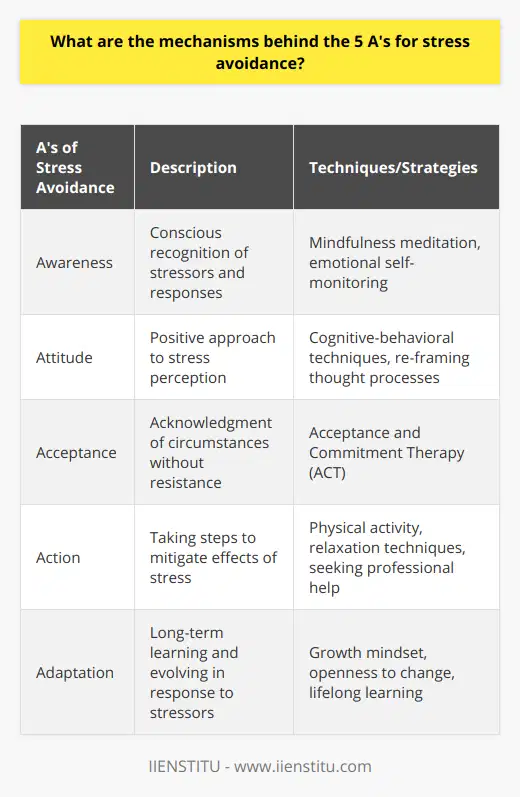
Can you provide a comprehensive analysis of the 12 healthy ways to cope with stress and their effectiveness?
Stress-Coping Strategies and Effectiveness
Understanding Stressors
A comprehensive analysis of the 12 healthy ways to cope with stress emphasizes the initial identification of stressors. Recognizing the sources of stress enables individuals to develop tailored coping mechanisms for maximum effectiveness.
Physical Activity and Relaxation Techniques
Engaging in regular physical activity offers a powerful stress-reduction tool. Exercise triggers endorphin production, leading to improved mood and enhanced mental clarity. Additionally, relaxation techniques such as deep-breathing exercises, mindfulness meditation, and progressive muscle relaxation address stress-related tension in the body and encourage mental stillness.
Healthy Eating
Consuming well-balanced, nutritious meals helps maintain optimal energy levels and cognitive function under stress. Limiting processed and sugary foods reduces the risk of exacerbated stress levels due to unstable blood sugar levels.
Sleep Hygiene
Prioritizing sufficient restorative sleep supports emotional resilience and cognitive function. Creating a consistent sleep schedule, developing a pre-sleep routine, and maintaining a sleep-conducive environment contribute to better stress management.
Social Support
Strong social support networks effectively buffer stress by providing emotional encouragement, practical assistance, and opportunities for sharing feelings with others. Surrounding oneself with nurturing relationships enhances overall mental health.
Time Management Techniques and Goal Setting
Developing time management skills and prioritizing tasks conserves personal energy resources, which mitigates stress. Breaking larger goals into smaller, achievable steps ensures continued progress and a heightened sense of accomplishment.
Assertiveness and Boundaries
Cultivating assertiveness allows for the vocalization of needs and sets limits, contributing to a balanced lifestyle. Establishing healthy boundaries reduces the likelihood of feeling overwhelmed and minimizes stress-related decision fatigue.
Cognitive Reframing
Cognitive reframing techniques encourage personal responsibility and a proactive mindset. Changing perspectives on stressors improves interpretations of situations, generating healthier emotional responses.
Creativity and Hobbies
Engaging in creative outlets and hobbies has therapeutic benefits, providing a release from stress and fostering a state of flow. As a result, individuals experience increased happiness and satisfaction.
Humor and Laughter
Laughing serves as a natural stress reliever by decreasing cortisol levels and stimulating endorphin production. Enjoying humor helps to maintain perspective and promotes a positive outlook on life.
Acceptance
Accepting what cannot be controlled and focusing on what can be managed contributes to a greater sense of serenity. It allows individuals to navigate stress more effectively.
Professional Help
Seeking professional help addresses emotional, cognitive, and behavioral issues contributing to stress. Support from licensed mental health professionals enables targeted coping strategies and long-term wellbeing.
In summary, adopting these 12 healthy coping methods allows for optimum stress reduction and establishes productive habits for improved mental health and overall wellbeing in everyday life.

In what ways do the 3 suggested stress prevention techniques contribute to long-term psychological well-being?
Stress Prevention Techniques and Psychological Well-being
Cognitive Restructuring
Cognitive restructuring, as a stress prevention technique, contributes to long-term psychological well-being by altering negative thought patterns. This technique involves regular reflection and self-awareness of irrational thoughts and beliefs that trigger stress. By challenging and reframing these negative thought cycles, individuals can promote a healthier mindset that fosters resilience and stress reduction. The effectiveness of cognitive restructuring in enhancing mental well-being remains consistently supported by empirical evidence.
Physical Activity and Relaxation
Incorporating regular physical activity and relaxation techniques into daily routines can positively impact long-term psychological health. Engaging in exercises such as yoga, meditation, or aerobic activities, releases endorphins which help reduce stress levels and promote feelings of happiness and relaxation. In addition, practicing mindfulness offers numerous benefits, including a better ability to cope with difficult emotions and improved stress management. Scientific research repeatedly demonstrates the effectiveness of physical activity and relaxation strategies for bolstering psychological well-being.
Social Support Networks
Having a strong social support network is integral for maintaining long-term psychological well-being. Developing and maintaining close relationships with friends, family, and peers provide a sense of belonging and emotional security that counteracts stress. Communicating with others and seeking help when needed can alleviate the burden of stress and facilitate the development of effective coping mechanisms. Numerous studies highlight the integral role of social support networks in fostering resilience, attenuating stress, and promoting overall mental health.
In conclusion, the three stress prevention techniques of cognitive restructuring, physical activity and relaxation, and utilizing social support networks contribute to long-term psychological well-being by enhancing personal resilience and fostering healthier thought patterns. The empirical evidence substantiating the effectiveness of these techniques reinforces the importance of incorporating them into daily life for improved psychological health.
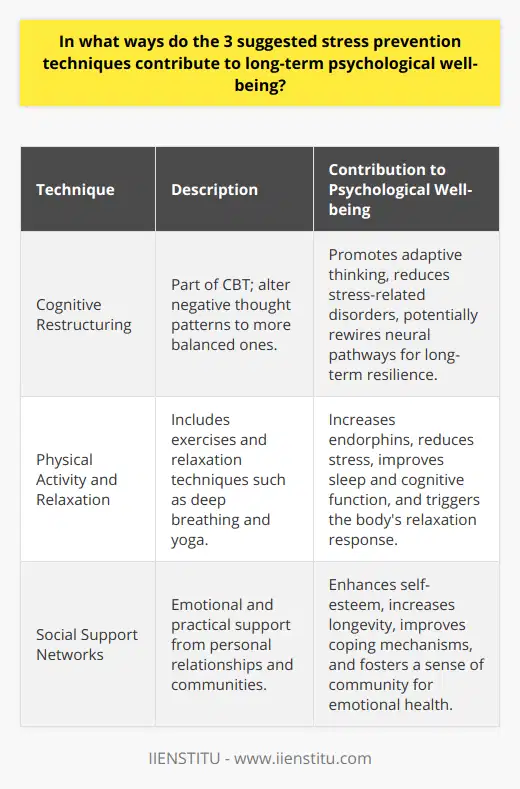
What are the 5 A's of stress relief?
The 5 A's of stress relief are Acknowledge, Accept, Attitude, Alternate, and Assist.
Firstly, Acknowledge refers to the recognition of stress in one's life. This might seem obvious, but many people often overlook their stress levels, which exacerbates the problem. Recognizing stress is crucial because it forms the basis for coping mechanisms.
Secondly, Accept is the aspect that necessitates the acceptance of realities that are beyond one's control. Learning to accept things as they are aids in lowering one's stress levels significantly. It promotes emotionally healthy responses to stressful situations.
The third pillar, Attitude, denotes the necessity of making conscious efforts to remain positive amidst stressors. Maintaining a positive attitude significantly lessens stress's adverse impacts. An optimistic perspective helps you process stress more effectively and minimizes its harmful effects.
Alternate is the fourth ‘A’ of stress relief. It's about creating alternative plans to cope with stress. Having multiple coping strategies is vital because it provides different ways to manage stress. Actively seeking new stress-relieving techniques keeps stress at bay.
The final 'A,' Assist, involves seeking help where necessary. It may be through professional counselling or a support group. Alternatively, it could mean joining a healthy social network. Remember, it’s okay to ask for help when stress becomes unbearable.
In conclusion, understanding and implementing the five A's of stress relief offer practical coping mechanisms. They provide a comprehensive system to acknowledge, accept, and minimize stress while promoting positivity and seeking help when necessary. Therefore, implementing these tactics leads to an improved overall sense of well-being for individuals facing stressful situations.
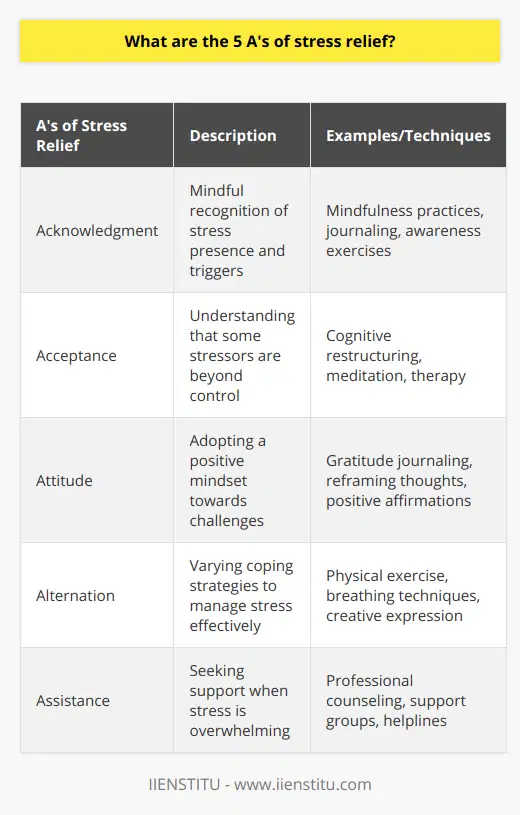
How do you release stress from your body?
Engaging in Physical Activity
Engaging in physical activity is a proactive method to release stress from your body. This could be exercise like jogging or yoga. Regular exercise promotes production of endorphins. These are your body's natural mood lifters.
Deep Breathing Techniques
Deep breathing techniques can also be useful. It is a simple yet effective way to release stress. It promotes full oxygen exchange which slows heartbeat and lowers blood pressure. This further reduces your stress levels.
Balanced Nutrition
Consuming a balanced diet also plays a part. Certain foods can quell stress, like complex carbohydrates. These carbohydrates promote the production of serotonin, a calming hormone. In addition, keep yourself hydrated to keep your body stress-free.
Practicing Mindfulness
Mindfulness is another key tool to reduce stress. This involves being fully aware of the present moment. Acknowledge feelings, thoughts, and sensations without judgement.
Adequate Rest
Ensure adequate rest for your body. Quality sleep relieves stress and rejuvenates the body. Avoid caffeine and practice relaxing bedtime rituals.
Social Interaction
Lastly, engage in social interactions. They are known for their stress-busting effects. Talk to a friend, join a club or seek out social activities that you enjoy.
Each aforementioned method offers a different approach to releasing stress from the body. Practice one or more to find the most effective method for you. Regular incorporation of these practices can help maintain a stress-free body. It's essential to understand that the aim is stress management, not total removal. Some stress is necessary and productive. The goal is to harness it effectively.
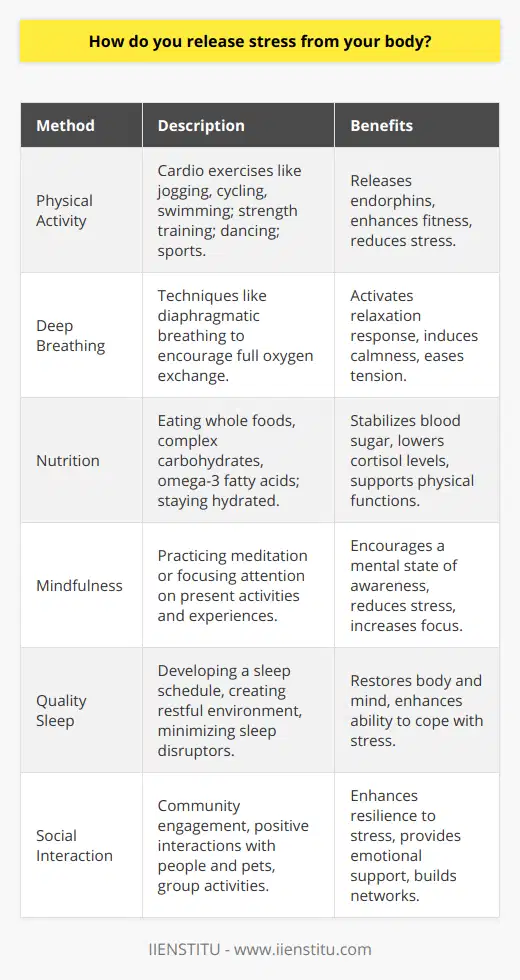
What's the best stress reliever?
The Effects of Physical Exercise
A plethora of research suggests that physical exercise acts as the most effective stress reliever. Engaging in physical activity can elevate the production of endorphins, the brain's feel-good neurotransmitters. This biochemical process is frequently referred to as the 'runner's high.'
Role of Mindfulness and Meditation
Mindfulness and meditation also play an integral role in relieving stress. They help by calming the mind and enhancing self-awareness. These practices allow individuals to focus on the present moment, reducing feelings of anxiety and stress.
Benefit of a Balanced Diet
A balanced diet can indirectly alleviate stress. Proper nutrition supplies the body with essential nutrients that support physical health and emotional well-being. Consuming foods rich in vitamins, minerals, and antioxidants boosts overall health, contributing to better stress management.
Power of Adequate Sleep
Adequate sleep enhances emotional resilience and provides a boost in coping with stress. Sleep helps reset the brain and body, providing a fresh perspective to handle stressors effectively.
Importance of Social Connections
Finally, maintaining robust social connections is instrumental in managing stress. Socializing provides an environment for emotional support, contributing immensely to stress reduction. Healthy social interaction creates feelings of belonging and acceptance, further reducing stress levels.
In conclusion, several strategies effectively alleviate stress. However, the combination of physical exercise, mindfulness practices, a balanced diet, adequate sleep, and maintaining strong social ties seems to be the optimum path for relieving stress. These practices promote overall well-being and help individuals manage stress effectively.
